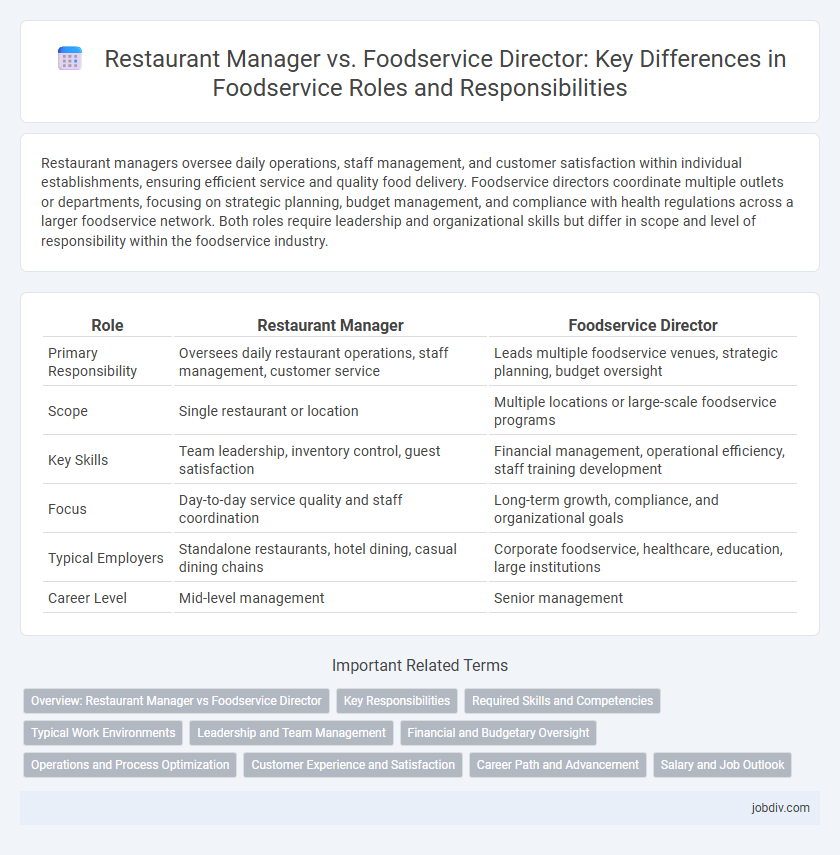Restaurant managers oversee daily operations, staff management, and customer satisfaction within individual establishments, ensuring efficient service and quality food delivery. Foodservice directors coordinate multiple outlets or departments, focusing on strategic planning, budget management, and compliance with health regulations across a larger foodservice network. Both roles require leadership and organizational skills but differ in scope and level of responsibility within the foodservice industry.
Table of Comparison
| Role | Restaurant Manager | Foodservice Director |
|---|---|---|
| Primary Responsibility | Oversees daily restaurant operations, staff management, customer service | Leads multiple foodservice venues, strategic planning, budget oversight |
| Scope | Single restaurant or location | Multiple locations or large-scale foodservice programs |
| Key Skills | Team leadership, inventory control, guest satisfaction | Financial management, operational efficiency, staff training development |
| Focus | Day-to-day service quality and staff coordination | Long-term growth, compliance, and organizational goals |
| Typical Employers | Standalone restaurants, hotel dining, casual dining chains | Corporate foodservice, healthcare, education, large institutions |
| Career Level | Mid-level management | Senior management |
Overview: Restaurant Manager vs Foodservice Director
A Restaurant Manager oversees daily operations, staff management, customer service, and inventory within a single establishment, emphasizing efficient workflow and high guest satisfaction. In contrast, a Foodservice Director manages multiple foodservice sites or an entire foodservice program, focusing on strategic planning, budgeting, compliance, and coordination across various locations. Both roles require strong leadership and operational expertise, but the Foodservice Director holds broader responsibilities with a focus on organizational growth and policy implementation.
Key Responsibilities
Restaurant Managers oversee daily operations of individual dining establishments, focusing on staff supervision, customer service, and inventory management. Foodservice Directors manage multiple foodservice units or entire departments, emphasizing strategic planning, budgeting, compliance with health regulations, and overall program development. Key responsibilities for Foodservice Directors include policy implementation, staff training programs, and coordination with suppliers to ensure efficient service delivery across locations.
Required Skills and Competencies
Restaurant Managers require strong operational skills, staff supervision abilities, and customer service expertise to ensure daily restaurant functions run smoothly. Foodservice Directors need advanced strategic planning, budget management, and compliance knowledge to oversee multiple locations or large-scale foodservice operations. Both roles demand leadership, communication proficiency, and problem-solving capabilities, but Foodservice Directors emphasize organizational management and long-term planning more heavily.
Typical Work Environments
Restaurant Managers typically operate within individual dining establishments, overseeing daily front-of-house and kitchen operations to ensure customer satisfaction and efficient service. Foodservice Directors work in larger or multiple foodservice settings such as hospitals, schools, corporate cafeterias, and institutional environments, managing broader operational strategies and compliance across various locations. Both roles require adapting to fast-paced, dynamic environments but differ in scale and organizational complexity.
Leadership and Team Management
Restaurant Managers oversee daily operations, ensuring staff efficiency and guest satisfaction while directly managing front-of-house and kitchen teams. Foodservice Directors hold broader leadership roles, developing strategic plans, managing multiple units or locations, and leading cross-functional teams to meet organizational goals. Both positions require strong communication, conflict resolution, and motivational skills to foster a productive and cohesive work environment.
Financial and Budgetary Oversight
Restaurant managers typically handle daily financial operations, including cash flow management, cost control, and budgeting for labor and supplies within a single location. Foodservice directors oversee broader financial strategies across multiple units or departments, developing comprehensive budgets, forecasting revenue, and ensuring overall financial performance aligns with organizational goals. Their budgetary oversight includes managing capital expenditures, negotiating vendor contracts, and implementing cost-saving initiatives at a macro level.
Operations and Process Optimization
A Restaurant Manager primarily oversees daily front-of-house operations, ensuring smooth service flow, staff coordination, and customer satisfaction within a single location. In contrast, a Foodservice Director manages multiple units or entire foodservice operations, focusing on strategic process optimization, cost control, and standardized procedures to enhance efficiency and scalability. Both roles require strong leadership, but the Foodservice Director emphasizes operational systems and long-term performance metrics across broader organizational levels.
Customer Experience and Satisfaction
Restaurant Managers directly oversee daily operations, ensuring staff deliver high-quality service and promptly address customer feedback to enhance dining satisfaction. Foodservice Directors develop strategic initiatives that align service standards with overall brand goals, driving consistency and superior customer experience across multiple outlets. Both roles prioritize customer satisfaction but differ in scope, with Managers focusing on immediate service delivery and Directors steering long-term experiential improvements.
Career Path and Advancement
A Restaurant Manager typically oversees daily operations, staff management, and customer service within a single location, serving as a foundational role in the foodservice industry. In contrast, a Foodservice Director manages multiple outlets or an entire foodservice program, focusing on strategic planning, budgeting, and large-scale operational efficiency. Career advancement often progresses from Restaurant Manager to Foodservice Director by gaining experience in leadership, financial management, and multi-unit oversight.
Salary and Job Outlook
Restaurant Managers typically earn an annual salary ranging from $50,000 to $70,000, with moderate job growth projected at around 6% through 2030. Foodservice Directors, overseeing larger operations, command higher salaries averaging between $70,000 and $100,000, benefiting from a stronger job outlook due to increasing demand in institutional foodservice management. Both roles require leadership skills, but Foodservice Directors face broader responsibilities, contributing to their elevated compensation and career advancement opportunities.
Restaurant Manager vs Foodservice Director Infographic

 jobdiv.com
jobdiv.com